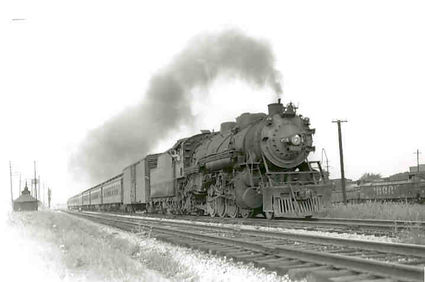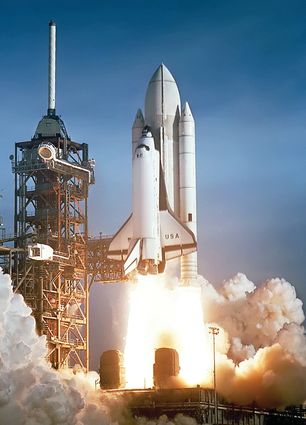Down Life's Highway...Slow Trains to Fast Planes--The Speed of One Lifetime
Last updated 9/22/2020 at 10:40pm
One's mind can't imagine the marvels of the future or the dangers that lie ahead...
Sometimes I yearn for days long past, when the pace was slower, people more compassionate and murder was seldom heard of. No one tried to keep up with the Jones's, because the Jones's didn't have anything either. We were too poor to pay attention to the fact that we were poor.
Days came and days went: we didn't complain. We welcomed the new day and got on our knees and gave thanks at day's end. It didn't seem to matter that we didn't have running water: we were just grateful that our pump well didn't run dry. Electricity was something you saw uptown. Our coal oil lamp was full and had enough wick to last through the chores and homework.
Transportation was as fast as you wanted it. You could walk or run at your own pace. Food was often scarce but whatever Mom fixed was OK.
Our shoes were used only for church day, but our soles were tough enough to walk the gravel road. Our clothes were sewed from whatever material was available most often feed and flour sacks.
Work was hard; the cotton fields hot, the rice fields were snake infested. Planting and digging potatoes and peanuts were backbreaking and dirty. Saturday meant a bath in a No. 3 washtub in good, sun-warmed water. The dirtiest got the last spot.
Goodies like candy were hard to come by. A piece of peppermint off the stick was a treat. July and August brought watermelon, hot, right out of the field, borrowed from the farmer after sundown.
The treat of the year came in September, October and November when sugar cane was plentiful.
I lived a hundred yards from a cane derrick and scale that loaded the crop in boxcars bound for Steen's syrup mill or to Imperial Sugar or other companies.
Every boy had a pocketknife sharpened to a razor's edge. I could peel six or seven joints of cane at once. Quartered every two inches put four pieces of blue ribbon juice in my mouth. After a long day of constant chewing, your jaws had trouble operating the next morning...but you repeated this process anyway.
I'd drive the mules and wagon up to the scale and learned to drive a tractor there by age twelve.
In my mind, I'm always going home. But in my heart I hold dear the road I've traveled. As luck would have it I lived during the most exciting period in our history. I've often been at the right place for many great events. What's changed most in 80-plus years is speed. Everything is faster today. From a nine-day letter to a three-second fax, from, a party-line to one where you can see each other.
I've had a love affair with the old steam engine train for as long as I can remember. I counted its cars through the cracks of the little shotgun house from my pallet on the floor. Instead of sheep, that's how I counted myself to sleep. On a clear day in the South Louisiana flatlands, I could see its steam rising four or five miles away. I heard its whistle when it left Erath, (pronounced E-rat). The train was the fastest transportation around. Ten minutes later it arrived at the derrick.
I again found myself at the right spot to marvel at another historical event and witness how fast speed has really gotten. On a Tuesday night, July 27, 1999, nine minutes past 10 p.m. a look to the sky over Beaumont found an unfamiliar sight. The lights approaching between Bridge City and the Rainbow Bridge grew brighter---four large lights on two wings, landing lights and two red ones on top. The object passed under a full moon, in clear view, like a big bird. It didn't make the usual sound of an airplane. Its approach appeared much lower; I'm sure than it probably was.
I watched it until it was about over Cameron, La., what seemed like a minute or so, but what was probably much shorter. I retrieved an item from my car, went in and turned on CNN on television. Just nine minutes after I watched it sail the Southeast Texas sky, the Spaceship Columbia landed in Cape Canaveral, Fla. You heard me, I said nine minutes. That beat the train from E-rat to Abbeville, 6 miles, by one minute. It had slowed down to 3,300 miles per hour from 15,000 when it went over. The Space Shuttle Columbia unfortunately disintegrated over Texas on Feb. 1, 2003 on it's re-entry into Earth's atmosphere. Seven crew members died in that crash.
To really understand the significance of that-which today's youngsters never will-you would've had to drive a team of mules pulling a wagon full of cotton to Youngsville, 14 miles away, leaving at first light, ginning the cotton and returning by lantern light.
The historical event I had been privileged to view was the Space Shuttle Columbia returning to earth after a trip into orbit to drop off the world's most powerful x-ray telescope.
The spacecraft was commanded by the first female ever at the controls. Air Force Col. Eileen Collins, 42 years old, had guided the shuttle right over where I stood in amazement, then to the beautiful landing that I watched moments later on TV.
The crew consisted of five astronauts, two women, and three men. I had truly witnessed history in the making. The next morning I mentioned it to my 18-year-old granddaughter Amber, "Oh, really," was her only response.
I remember one time she had used my rotary phone and complained about how slow it was. "Why don't you have a touch-tone?" she had asked. "Just a touch of the past," I answered.
Before that, years ago, I had asked the operator to dial 396 for me and she told me that the Broussard's, were out of town. Operators knew everyone with a phone.
So you see, like my memories of long ago, the event of the spaceship that took place just before the turn of the century will grow in her mind as she relates the story 50 years from now.
Youngsters today have no reference to anchor the idea of how fast speed has gotten. They will never experience waking up soaking wet with sweat after a hot summer night, long before air conditioning and a thermostat set on 72 degrees because 76 is not cold enough.
Today's child can travel the world in seconds on the Internet. They carry telephones in their pockets and have Call Waiting to handle two calls at once. They keep in touch with Text Messaging, Facebook, Twitter, Zoom, and many other Internet programs. They send photos and video's instantly as they happen.
Man landed on the moon 50 years ago, science fiction to me as a boy, old hat to the youth of today. They really have missed the wonder of some things by having nothing to measure them against. What is their point of reference going to be?
We remember the Great Depression that took FDR ten years to fix. Maybe their point will be the election of the first Black president, with the strange sounding name or the hurricanes Katrina, Rita and Ike.
As I look toward tomorrow I fear that we have entered a new phase that puts our democracy, the one thing that separates us from all others, in jeopardy at home. I feel for the first time in this long life that our country is in danger from within. There's a darkness I've never felt before. The biggest surprise of my life is how fast I have traveled down this life's highway and the multitude of changes I've lived through.
I never could have imagined that over 200,000 Americans would have died in less that one year, more than in all wars since WWI, in a pandemic that our government failed miserably to manage and save lives. Many more will die as we approach 7-million coronavirus cases. It didn't have to happen this way. Leadership failed us. Mostly however folks of my generation will be surprised at how fast the years Down Life's Highway went by.

















Reader Comments(0)